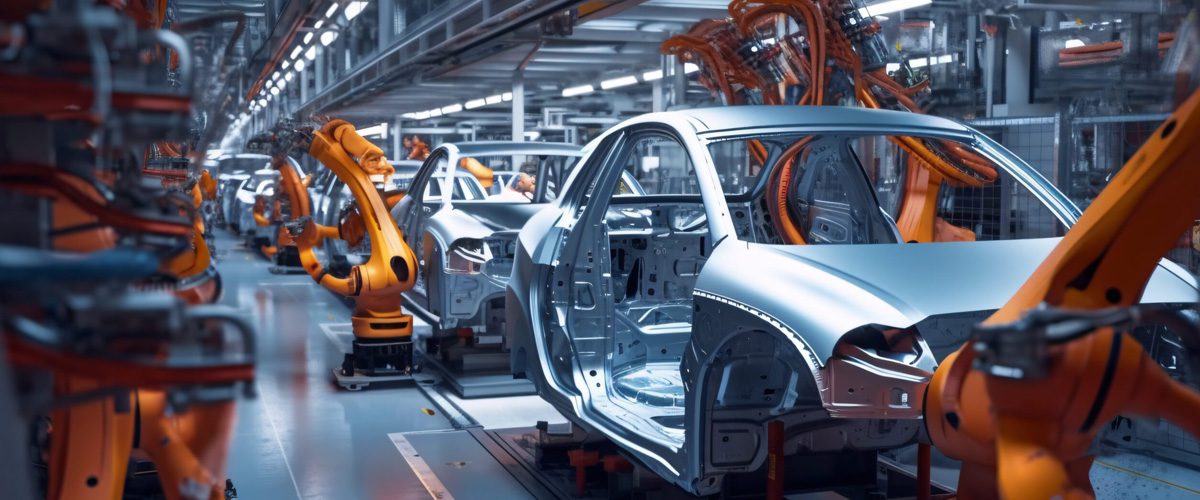The automotive industry is part of the consumer discretionary sector and includes the production of both passenger and commercial vehicles, as well as auto components.
Demand in the automotive sector can be separated into two categories: direct and derived. Direct demand represents finished vehicles, while derived demand is the demand for auto components that is derived and contingent upon the volume of vehicles sold.
Driven by rising consumerist sentiment and higher disposable incomes in most countries, the demand for automobiles has been steadily increasing over the years. Global auto sales exceeded 67 million units in 2022, with the growth expected to continue over the next decade at a CAGR of 7% between 2023 and 2033.
Globally, the Asia Pacific region is the biggest market, followed by North America and Europe.
It is anticipated that the electric vehicles segment will primarily drive the growth of the automotive sector in the forthcoming years. Even in the period from 2011 to 2021, the sales of electric vehicles in the US, as a proportion of total cars sold, have steadily expanded, from 0.2% in 2011 to 4.6% in 2021. The electric vehicles market is expected to reach $457.60 billion in 2023 and record a CAGR of 17% for the 2023-2027 period.
Automotive logistics market and international trade
The automotive sector is an example of a truly globalized industry. Since there is significant demand for automobiles and auto components in all regions across the globe, and with significant production capacity in Asia, North America, and Europe, multiple countries are involved in the export or import of automobiles and components thereof.
With each vehicle having 15,000 to 20,000 components and over 50% of car parts still sourced overseas, automotive components constitute a sizeable international trade segment.
This trend is expected to accelerate further as rising disposable incomes in emerging economies and a corresponding rise in discretionary spending have led to a commensurate increase in demand for passenger and commercial vehicles.
China’s emergence as the global leader in the electric vehicles segment will only accentuate the phenomenon, as it is now the world’s biggest producer and consumer of electric vehicles. Sales of electric vehicles have grown exponentially, from 1.3 million in 2020 to 6.8 million in 2022. China has been the largest electric vehicle market for eight consecutive years.
Trade wars and geo-political tensions too have played a key role in the geographical diversification of the automotive sector, with European car manufacturers looking to shift a part of their production to countries such as Vietnam and Indonesia.
It is thus safe to conclude that we will witness robust growth in the international transport of automobiles, with corresponding growth in automotive logistics. Globalization of the sector will intensify as new markets emerge and more countries develop automotive manufacturing capacity.
Supply chain and logistical challenges faced by the Automotive sector
With geographically stretched supply chains and a multitude of sourcing locations, it is inevitable that the automotive sector will face numerous logistical challenges, especially in the current scenario.
The top logistical and supply chain issues facing the automotive sector are explained below:
1. Tariff barriers: As protectionist tendencies take precedence over pragmatism, countries across the world have imposed tariffs on imports of various automotive components. This has devolved into a cycle of retaliatory tariffs and counter-sanctions by other countries, slowing world trade and hampering logistical activities. This, in turn, has affected the supply of raw materials to manufacturing centers and the transport of assembled automobiles to consumer markets.
2. Trade agreements: Governments are now trying to boost trade and exports by entering into free trade agreements, bilateral agreements, and forming regional trading blocs, all of which are aimed at increasing international trade amongst the signatories and to the exclusion of non-member countries. This has opened access to new markets while constricting existing markets. Automotive companies have therefore been constrained to redesign supply chains and logistics processes to account for altered trade relations and cargo flows.
3. Compliance with regulations: The automotive sector is subject to numerous regulations in which compliance is legally mandatory. These regulations might be with respect to various aspects such as the finished vehicle, individual components, souring locations, preferential tariffs, and trade quotas. Given the vast number of applicable laws, automotive manufacturers must not only keep themselves aware of all relevant rules but also exercise due diligence to ensure compliance therewith. Failure to comply with regulations can result in stiff penalties.
4. Inventory management and visibility: The sheer number of spare parts and components that go into the manufacturing of an automobile implies that inventory planning is a complex process. It is even more critical to ensure that there are adequate stocks of each component, depending on their criticality and the availability of substitutes. This requires robust inventory visibility and management policies.
5. Supply chain disruptions: The ubiquitous supply chain disruptions that have plagued global supply chains have affected automotive supply chains, as delayed deliveries, inadequate supplies, and unreliable transport schedules have added to direct and indirect costs in the transport process.
What KlearNow can offer the Automotive sector
KlearNow helps the automotive vertical overcome major industry-specific supply chain challenges by digitizing customs and logistics workflows.
KlearNow’s technological solutions facilitate this by:
1. Improving compliance: the KlearNow platform uses data ingestion to process customs documentation processes and notify all relevant parties in case the documentation is incomplete or inaccurate. With AI automating the process of tracking applicable regulations and ensuring compliance therewith, we reduce the risk of incurring penalties or supply chain disruptions.
2. Streamlining automotive supply chains: AI-based platforms can optimize customs processes, reduce lead times, and improve delivery accuracy, thus helping companies respond quickly to changes in demand, market dynamics, and regulatory framework.
3. Reducing costs: using AI to automate manual processes helps reduce the cost of compliance, customs clearance, and supply chain management. This is especially beneficial to tier 2 and tier 3 automotive companies, which generally do not possess EDI infrastructure, but have multiple high-line items. KlearNow’s digitized platform offers all-inclusive pricing with unlimited lines, PGAs, and no ancillaries.
4. Providing visibility: The nature of the automotive business is such that companies need to place multiple and frequent orders for spare parts and components. Therefore, visibility is extremely important, which KlearNow’s platform enables through functionalities such as origin management, full end-to-end track, and trace with live ETAs, demurrage eliminator tools, and port intelligence.
5. Enhancing decision-making: AI-powered platforms provide real-time information on tariffs, trade agreements, and regulations, thereby enabling companies to make informed decisions that minimize risk and optimize operational efficiency.
Specific functionalities and benefits of the KlearNow product
Some of the more notable functionalities of the KlearNow product and associated benefits are explained below:
1) End-to-End Supply Chain visibility:
This includes visibility on documentation and information sharing, shipment status and Customs milestones (regardless of carrier/ forwarder/ mode of transport), and terminal-level visibility and Port Intelligence.
This helps timely and accurate sharing of relevant information with all parties, makes it possible to plan onward cargo movements in advance, and reduces demurrage and detention charges.
2) Smart Drayage for last-mile connectivity:
KlearNow also allows importers to select a drayage partner weeks in advance.
This helps the cargo owner to control costs and receive live ETA’s, thus reducing the probability of being stuck in supply chain bottlenecks.
3) Data ingestion:
This involves creating digital assets using artificial intelligence and machine learning to complete and deliver customs entry filings.
This helps ensure that the documents and data filed are accurate, comply with all statutory requirements, and are filed with authorities within stipulated timelines.
Conclusion
The automotive sector’s requirements necessitate an intricately designed supply chain to cater to the sector’s unique requirements. Technology is fast becoming an indispensable adjunct in supply chain and transport planning, which is where KlearNow has emerged as a frontrunner in providing cutting-edge software solutions.
KlearNow’s AI-powered data ingestion platform includes features such as real-time visibility, drayage partner selection, and customs documentation processing, which helps automotive companies manage their supply chains much more effectively.
The improved quality of decision-making and supply chain reliability can be a distinctive competitive differentiator, paving the way for superior customer experience.
Utilizing KlearNow has helped customers improve day-to-day logistics management by 80%, reduce document processing time by 70%, and helped improve global customs compliance by 95%.For more information on how KlearNow can help your business, please click here.

